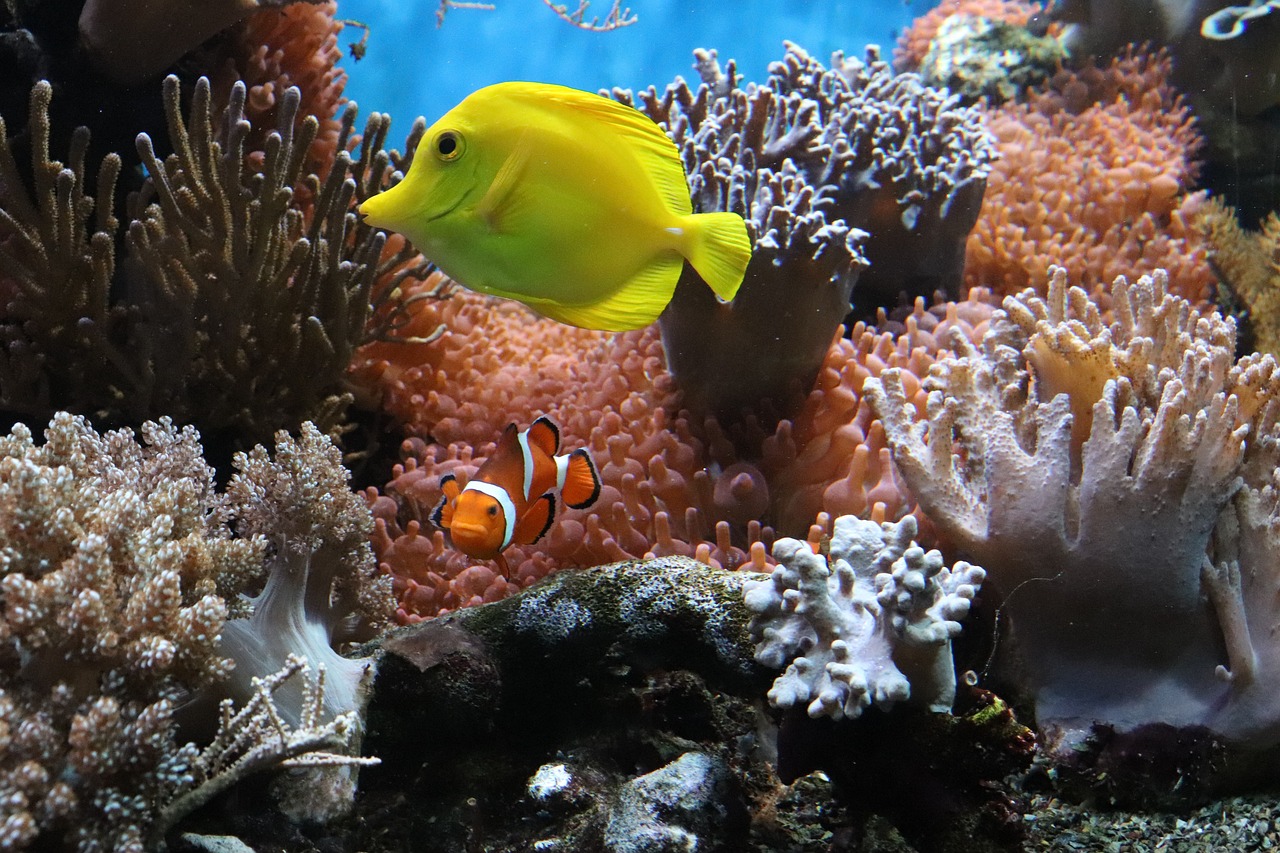In the inaugural “State of the Science” address, National Academy of Sciences President Marcia McNutt recommended an array of actions to bolster U.S. global leadership in science — including improving K-12 science education, modernizing university-industry research partnerships, and developing a national strategy to coordinate research.
In her address, Dr. McNutt identified six opportunities to improve U.S. scientific leadership. For each of these goals below, we’ve added a list of National Academies publications that explore the topic further, providing additional information and presenting guidance to achieve the goal.
Improve K-12 education. As competition for international talent increases, the nation should focus on developing its domestic workforce by strengthening K-12 science education – an effort that should focus on nurturing the innate curiosity of children. Supporting informal STEM education programs is also important.

Starting in early childhood, children are capable of learning sophisticated science and engineering concepts and engage in disciplinary practices. They are deeply curious about the world around them and eager to investigate the many questions they have about their environment. Educators can develop learning environments that support the …[more]

Cultivating Interest and Competencies in Computing: Authentic Experiences and Design Factors
Computing in some form touches nearly every aspect of day to day life and is reflected in the ubiquitous use of cell phones, the expansion of automation into many industries, and the vast amounts of data that are routinely gathered about people’s health, education, and buying habits. Computing is now a part of nearly every occupation, not only …[more]

Transforming Trajectories for Women of Color in Tech
Demand for tech professionals is expected to increase substantially over the next decade, and increasing the number of women of color in tech will be critical to building and maintaining a competitive workforce. Despite years of efforts to increase the diversity of the tech workforce, women of color have remained underrepresented, and the …[more]

Call to Action for Science Education: Building Opportunity for the Future
Scientific thinking and understanding are essential for all people navigating the world, not just for scientists and other science, technology, engineering and mathematics (STEM) professionals. Knowledge of science and the practice of scientific thinking are essential components of a fully functioning democracy. Science is also crucial for the …[more]

Science and Engineering for Grades 6-12: Investigation and Design at the Center
It is essential for today’s students to learn about science and engineering in order to make sense of the world around them and participate as informed members of a democratic society. The skills and ways of thinking that are developed and honed through engaging in scientific and engineering endeavors can be used to engage with evidence in …[more]

Learning Through Citizen Science: Enhancing Opportunities by Design
In the last twenty years, citizen science has blossomed as a way to engage a broad range of individuals in doing science. Citizen science projects focus on, but are not limited to, nonscientists participating in the processes of scientific research, with the intended goal of advancing and using scientific knowledge. A rich range of projects …[more]

English Learners in STEM Subjects: Transforming Classrooms, Schools, and Lives
The imperative that all students, including English learners (ELs), achieve high academic standards and have opportunities to participate in science, technology, engineering, and mathematics (STEM) learning has become even more urgent and complex given shifts in science and mathematics standards. As a group, these students are underrepresented …[more]

Graduate STEM Education for the 21st Century
The U.S. system of graduate education in science, technology, engineering, and mathematics (STEM) has served the nation and its science and engineering enterprise extremely well. Over the course of their education, graduate students become involved in advancing the frontiers of discovery, as well as in making significant contributions to the …[more]

Identifying and Supporting Productive STEM Programs in Out-of-School Settings
More and more young people are learning about science, technology, engineering, and mathematics (STEM) in a wide variety of afterschool, summer, and informal programs. At the same time, there has been increasing awareness of the value of such programs in sparking, sustaining, and extending interest in and understanding of STEM. To help policy …[more]

Nearly 40 percent of the students entering 2- and 4-year postsecondary institutions indicated their intention to major in science, technology, engineering, and mathematics (STEM) in 2012. But the barriers to students realizing their ambitions are reflected in the fact that about half of those with the intention to earn a STEM bachelor’s degree …[more]

A Framework for K-12 Science Education: Practices, Crosscutting Concepts, and Core Ideas
Science, engineering, and technology permeate nearly every facet of modern life and hold the key to solving many of humanity’s most pressing current and future challenges. The United States’ position in the global economy is declining, in part because U.S. workers lack fundamental knowledge in these fields. To address the critical issues of …[more]
Reduce red tape. The U.S. should lessen red tape that can serve as a barrier for foreign students who wish to study in the U.S., as well as for graduates who wish to remain in the U.S. and work. Regulatory burden should also be reduced for faculty researchers at universities.

Immigration Policy and the Search for Skilled Workers: Summary of a Workshop
The market for high-skilled workers is becoming increasingly global, as are the markets for knowledge and ideas. While high-skilled immigrants in the United States represent a much smaller proportion of the workforce than they do in countries such as Australia, Canada, and the United Kingdom, these immigrants have an important role in spurring …[more]

Research universities are critical contributors to our national research enterprise. They are the principal source of a world-class labor force and fundamental discoveries that enhance our lives and the lives of others around the world. These institutions help to create an educated citizenry capable of making informed and crucial choices as …[more]

Policy Implications of International Graduate Students and Postdoctoral Scholars in the United States explores the role and impact of students and scholars on US educational institutions and the US economy. The nation has drawn increasingly on human resources abroad for its science and engineering workforce. However, competition for talent has …[more]

Research Universities and the Future of America presents critically important strategies for ensuring that our nation’s research universities contribute strongly to America’s prosperity, security, and national goals. Widely considered the best in the world, our nation’s research universities today confront significant financial …[more]

Rising Above the Gathering Storm: Energizing and Employing America for a Brighter Economic Future
In a world where advanced knowledge is widespread and low-cost labor is readily available, U.S. advantages in the marketplace and in science and technology have begun to erode. A comprehensive and coordinated federal effort is urgently needed to bolster U.S. competitiveness and pre-eminence in these areas. This congressionally requested report by …[more]
Create a national research strategy. As industry and philanthropy become major funders of research alongside government, there is an opportunity to coordinate research for better impact.

The Endless Frontier: The Next 75 Years in Science
The National Academy of Sciences hosted a symposium on February 26, 2020, that gathered top business, academic, and government leaders to explore whether the modern research architecture that fuels U.S. innovation needs to be reconfigured to meet the challenges of our time. The event was held in partnership with The Kavli Foundation and the …[more]

Protecting U.S. Technological Advantage
U.S. leadership in technology innovation is central to our nation’s interests, including its security, economic prosperity, and quality of life. Our nation has created a science and technology ecosystem that fosters innovation, risk taking, and the discovery of new ideas that lead to new technologies through robust collaborations across and …[more]

Nearly every major challenge the United States faces—from alleviating unemployment to protecting itself from terrorism—requires understanding the causes and consequences of people’s behavior. Even societal challenges that at first glance appear to be issues only of medicine or engineering or computer science have social and behavioral …[more]

Furthering America’s Research Enterprise
Scientific research has enabled America to remain at the forefront of global competition for commercially viable technologies and other innovations. For more than 65 years, the United States has led the world in science and technology. Discoveries from scientific research have extended our understanding of the physical and natural world, the …[more]

Rising Above the Gathering Storm Two Years Later: Accelerating Progress Toward a Brighter Economic Future summarizes a convocation held in April 2008 to commemorate the release of the original Gathering Storm report. The convocation featured participation by Members of Congress, Cabinet Secretaries, leaders from industry and academia, …[more]
Strengthen university-industry partnerships. Rules of university engagement with industry should be modernized, while remaining alert to possible conflicts of interest, which undermine public trust in science. Artificial intelligence is an important area for partnerships.

The rapid evolution of artificial intelligence (AI) technology underscores the need for public and private institutions to understand the impact of AI on research and development (R&D), workforce development, and policies and practices in every sector of society. AI offers tremendous benefits and opportunities, but also hazards and challenges, …[more]

Artificial Intelligence to Assist Mathematical Reasoning: Proceedings of a Workshop
Artificial intelligence (AI) has the potential to aid new mathematical discoveries. Particularly as the amount of data available grows beyond what any person can study, AI can be useful in its power to identify patterns in data and refine relationships between properties. Sponsored by the National Science Foundation, the National Academies of …[more]

Equitable and Resilient Infrastructure Investments
Communities across the United States are subject to ever-increasing human suffering and financial impacts of disasters caused by extreme weather events and other natural hazards amplified in frequency and intensity by climate change. While media coverage sometimes paints these disasters as affecting rich and poor alike and suggests that natural …[more]

The Earth system – the atmospheric, hydrologic, geologic, and biologic cycles that circulate energy, water, nutrients, and other trace substances – is a large, complex, multiscale system in space and time that involves human and natural system interactions. Machine learning (ML) and artificial intelligence (AI) offer opportunities to understand …[more]

Fostering the Culture of Convergence in Research: Proceedings of a Workshop
Convergence-based research approaches are critical in solving many scientific challenges, which frequently draw on large teams of collaborators from multiple disciplines. The 2014 report Convergence: Facilitating Transdisciplinary Integration of Life Sciences, Physical Sciences, Engineering, and Beyond describes the term “convergence” as …[more]

Convergence of the life sciences with fields including physical, chemical, mathematical, computational, engineering, and social sciences is a key strategy to tackle complex challenges and achieve new and innovative solutions. However, institutions face a lack of guidance on how to establish effective programs, what challenges they are likely to …[more]

America’s research universities have undergone striking change in recent decades, as have many aspects of the society that surrounds them. This change has important implications for the heart of every university: the faculty. To sustain their high level of intellectual excellence and their success in preparing young people for the various roles …[more]
Strengthen international partnerships. The U.S. should strengthen its partnerships with other countries, create well-communicated policies for where and when we will collaborate, and deploy procedures for evaluating the success of these collaborations.

Progress and Priorities in Ocean Drilling: In Search of Earth’s Past and Future
Research supported by scientific ocean drilling has fundamentally transformed our understanding of the planet with key contributions to the discovery and theory of plate tectonics; the formation and destruction of ocean crust; the reconstruction of extreme greenhouse and icehouse climates; the identification of major extinctions; and the …[more]

Antarctic Science: Why U.S. Leadership and Investments Matter
As the coldest, most remote, and most extreme environment on Earth, Antarctica provides a unique vantage point for investigating life adaptations, understanding the health of the global climate, and peering into the depths of the Universe. For example, ecological studies in the Dry McMurdo Valley help explain how life survives in extremes, …[more]

The Antarctic’s unique environment and position on the globe make it a prime location to gain insights into how Earth and the universe operate. This report assesses National Science Foundation (NSF) progress in addressing three priority research areas identified in a 2015 National Academies report: (1) understanding the linkages between ice …[more]

Enhancing the Effectiveness of Team Science
The past half-century has witnessed a dramatic increase in the scale and complexity of scientific research. The growing scale of science has been accompanied by a shift toward collaborative research, referred to as “team science.” Scientific research is increasingly conducted by small teams and larger groups rather than individual …[more]

Culture Matters: International Research Collaboration in a Changing World: Summary of a Workshop
In an increasingly interconnected world, science and technology research often transects international boundaries and involves researchers from multiple nations. This paradigm provides both new opportunities and new challenges. As science and technology capabilities grow around the world, United States-based organizations are finding that …[more]

Examining Core Elements of International Research Collaboration: Summary of a Workshop
The globalization of science, engineering, and medical research is proceeding rapidly. The globalization of research has important implications for the U.S. research enterprise, for the U.S. government agencies, academic institutions, and companies that support and perform research, and for the world at large. As science and technology …[more]

America’s Future in Space: Aligning the Civil Space Program with National Needs
As civil space policies and programs have evolved, the geopolitical environment has changed dramatically. Although the U.S. space program was originally driven in large part by competition with the Soviet Union, the nation now finds itself in a post-Cold War world in which many nations have established, or are aspiring to develop, independent …[more]
Cultivate trust in science. Researchers at all levels should be rewarded for producing research that is excellent and trustworthy. Training in research ethics should be emphasized at all levels, from students to experienced researchers. In addition, the research community should support excellence in communicating science to the public.
Established in 2021, the Strategic Council for Research Excellence, Integrity, and Trust serves as a venue for multiple stakeholders to advance collectively the integrity, ethics, resilience, and effectiveness of the research enterprise, while at the same time preparing it for tomorrow’s challenges. Learn more.

2023 Nobel Prize Summit: Truth, Trust, and Hope: Proceedings of a Summit
On May 24-26, 2023, the Nobel Prize Summit entitled Truth, Trust, and Hope was convened as a hybrid event to examine misinformation and disinformation in the context of the broader information ecosystem, looking at the global impact of information technologies in nature and society. The summit brought together Nobel laureates, leading …[more]

Misinformation about outbreaks, epidemics, and pandemics is a decades-old problem that has been exacerbated by the rise of the internet and the widespread use of social media. Some false claims may be addressed through sound scientific analysis, suggesting that scientists can help counter misinformation by providing evidence-based, …[more]

Communicating Science Effectively: A Research Agenda
Science and technology are embedded in virtually every aspect of modern life. As a result, people face an increasing need to integrate information from science with their personal values and other considerations as they make important life decisions about medical care, the safety of foods, what to do about climate change, and many other issues. …[more]

Automated Research Workflows for Accelerated Discovery: Closing the Knowledge Discovery Loop
The needs and demands placed on science to address a range of urgent problems are growing. The world is faced with complex, interrelated challenges in which the way forward lies hidden or dispersed across disciplines and organizations. For centuries, scientific research has progressed through iteration of a workflow built on experimentation or …[more]

Fostering Integrity in Research
The integrity of knowledge that emerges from research is based on individual and collective adherence to core values of objectivity, honesty, openness, fairness, accountability, and stewardship. Integrity in science means that the organizations in which research is conducted encourage those involved to exemplify these values in every step of …[more]

Reproducibility and Replicability in Science
One of the pathways by which the scientific community confirms the validity of a new scientific discovery is by repeating the research that produced it. When a scientific effort fails to independently confirm the computations or results of a previous study, some fear that it may be a symptom of a lack of rigor in science, while others argue …[more]

On Being a Scientist: A Guide to Responsible Conduct in Research: Third Edition
The scientific research enterprise is built on a foundation of trust. Scientists trust that the results reported by others are valid. Society trusts that the results of research reflect an honest attempt by scientists to describe the world accurately and without bias. But this trust will endure only if the scientific community devotes itself to …[more]










































































































